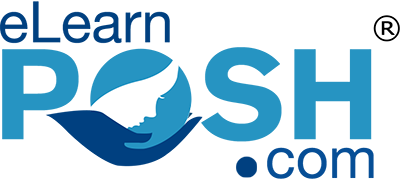POSH Foundation
POSH Foundation - Employee Awareness Training
This CBT (Computer-Based Training) course will introduce all the individual contributors to the law and policy, informing them about their rights and duties.
Since sexual harassment is a sensitive topic, employees generally have many questions regarding the same. Many employees are unaware of the legalities and their responsibilities to prevent Sexual Harassment at Workplace.
This course is designed to create awareness about the POSH law among employees by educating them on critical topics such as Intent vs. Impact, Sexual Harassment vs. Reasonable Behavior, Virtual Workplace: Do’s and Don’ts, Bystander Intervention, and Personal Relationships at the Workplace. The e-learning content is curated based on SME reviews and customer feedback.








![POSH Foundation 9 11]](http://elearnposh.com/wp-content/uploads/2024/03/11.png)

Features

Multilingual Course
India is a diverse country and some of our employees may be comfortable in their own languages and not just English. We celebrate this diversity and for this reason, along with English, POSH - Foundation eLearning is available in eight Indian languages - Hindi, Marathi, Bengali, Kannada, Telugu, Tamil, Malayalam and Gujarati without additional cost.

Fully Customizable
We do not believe in one-size fits all approach. Our courses can be fully customized to meet your organizational policies, brand standards and work culture. This includes the customization of look and feel, change of scenarios and content.

Remote Workforce & Virtual Harassment
As remote working has become more and more common, incidents of sexual harassment have also taken virtual forms. eLearnPOSH's course covers the workplace definition in the context of Extended workplace, the steps and tips to create a safe virtual workplace, Dos and Don'ts during video or conference calls to prevent Sexual Harassment.

Flexible Delivery
Does your organization have an internal learning portal? We can provide you with SCORM package to be hosted in your portal.
Would you like us to help you with the portal and courses as a package? Go for our SaaS offering. Our technology and delivery methods are extremely flexible. It can integrate and automate with your existing systems or authentication infrastructures.

Awareness for Blue-collar Workforce
eLearning may not be suitable for organizations with blue-collar workforce and employees who may not use a computer for their work. Our Mass Education License (MEL) option lets you train an unlimited number of blue-collar workforce in a classroom environment throughout the year. Includes optional WhatsApp-connect, Paper Assessment & Certificates.

Gender Neutral or Gender Specific
Does your organization have a gender-neutral POSH Policy? We have the right course for you. Does you organization have a policy that protects women from sexual harassment at workplace? We got you covered there too. We have separate versions of courses readily available to match your organizational policy.
Course Details

Course: POSH Foundation Module

Number of modules: 1

Duration: 45 min

Target audience: All employees
Salient Features
Animated & Interactive
Legally Accurate
Frequently Updated
Through this course, the employees should be able to:
- Identify sexual harassment in the workplace
- Describe the common types of sexual harassment
- Distinguish between reasonable and harassing behaviour of sexual nature
- Understand the difference between intent and impact
- Know what to do when you experience sexual harassment
- Know your rights and responsibilities to counter workplace sexual harassment
- Understand what is not sexual harassment
Complimentary Training for Managers
People managers are pivotal in ensuring POSH compliance within the workplace. Inadequate or mishandled responses to sexual harassment incidents by leadership can have profound repercussions for the organization, the team, and the affected individuals.
By opting for our employee training, your managerial staff will gain complimentary access to our specialized Manager-specific training. This module, tailored for managerial roles, delves into the intricacies of unbiased listening, effective complaint management, and collaboration with Internal Committees to guarantee fair proceedings.
This holistic approach ensures that every tier of your organization, from entry-level roles to the executive suite, is empowered with the essential tools and knowledge to combat workplace harassment.
To know more, visit
FAQs:
1.
What is the full form of POSH?
The full form of POSH is Prevention of Sexual Harassment. This concept is based on the Sexual Harassment of Women at Workplace (Prevention, Prohibition and Redressal) Act, 2013. This Act is also otherwise called the POSH Act, 2013. Under this Act, organizations have to adhere to certain compliance standards to prevent sexual harassment in the workplace.
2.
What is POSH Training?
Prevention of Sexual Harassment (POSH) training is a program designed to educate employees about recognizing, preventing, and addressing sexual harassment in the workplace. It typically covers the legal framework, company policies on harassment, employee rights and responsibilities, and procedures for reporting and handling complaints. The aim is to create a safe and respectful work environment. POSH training in an organization includes two primary levels: one for general employees and one specifically tailored for members of the Internal Committee (IC), responsible for addressing harassment complaints. Additionally, there is specialized training for managers. The content covered encompasses:
- For Employees: This training focuses on awareness about what constitutes sexual harassment, the legal framework, and company policies. It aims to educate employees on their rights, responsibilities, and the procedures for reporting incidents.
- For Internal Committee Members: This level delves deeper into the process of handling complaints, ensuring proper investigation, and maintaining confidentiality. It equips IC members with the skills necessary to address complaints sensitively and effectively.
- For Managers: This training typically covers how to create a respectful workplace culture, respond to reports of harassment, and support team members while adhering to legal and company policies. However, unlike employee and IC training, manager training is not a legal requirement but is often implemented to strengthen the organization’s commitment to a harassment-free workplace.
3.
What is the POSH Act?
The POSH (Prevention of Sexual Harassment) Act in India, formally known as the “Sexual Harassment of Women at Workplace (Prevention, Prohibition and Redressal) Act, 2013,” is a law aimed at preventing sexual harassment of women in the workplace. It mandates creating an Internal Committee in organizations with 10 or more employees, outlines procedures for handling complaints, and ensures confidentiality and protection for complainants. The Act covers all workplaces and applies to all women, irrespective of their employment status. It also requires organizations to conduct regular training and awareness programs about sexual harassment.
4.
Why POSH training?
POSH training is legally mandatory, with non-compliance leading to significant penalties. Beyond legal compliance, all employees need to understand what constitutes sexual harassment and the appropriate responses to such incidents. This training is crucial for protecting employees’ rights and promoting workplace equality and must be provided to everyone, regardless of their role or gender.
5.
Is compliance with the POSH Act mandatory?
Yes, compliance with the POSH (Prevention of Sexual Harassment) Act is mandatory for all organizations in India that have 10 or more employees. The Act requires these organizations to implement specific measures to prevent and redress sexual harassment in the workplace. This includes forming an Internal Committee (IC), conducting regular training and awareness programs, establishing a process for handling and resolving complaints, and ensuring protection and confidentiality for those involved in a complaint.
6.
How long is the POSH employee Training?
eLearnPOSH’s POSH employee training is designed to last 45 minutes. This duration is structured to effectively cover key topics such as understanding what constitutes sexual harassment, the legal framework of the POSH Act, and the procedures for reporting and addressing such incidents in the workplace.
7.
How do you provide POSH training to employees?
eLearnPOSH provides POSH training through a variety of e-learning courses tailored to the specific needs of different groups like employees, Internal Committee members, and managers. These courses are designed to be engaging and interactive, ensuring comprehensive understanding and compliance with POSH guidelines. Regular updates and feedback mechanisms help keep the training relevant and effective. Additionally, we conduct three Internal Committee webinars each year as part of our IC subscription. These webinars serve as an interactive platform for in-depth discussions, updates, and case studies, complementing the e-learning modules.
8.
What is the time limit under the POSH Act to file a complaint?
Under the POSH Act, a complaint of sexual harassment must be filed within 3 months of the last incident. In certain circumstances, the Internal Committee (IC) may extend this time limit to a further 3 months if the complainant can provide sufficient reason for the delay.
9.
What is the penalty under POSH Law?
Under the POSH Law, if an employer fails to comply with the statutory requirements, they can face a fine of up to INR 50,000. Repeated violations can lead to increased penalties, including a doubled fine for subsequent offences, and may even result in the cancellation of the business license or withdrawal of any governmental or statutory benefits. The Act emphasizes the importance of creating a safe work environment for women and holds organizations accountable for implementing and enforcing its provisions.
10.
What is sexual harassment in the workplace?
Sexual harassment refers to unwelcome or inappropriate behaviour of a sexual nature that is committed in a professional or social setting. It can occur in various forms, including verbal, non-verbal, or physical conduct. Sexual harassment is a violation of an individual’s rights and can create a hostile or intimidating environment.
Sexual harassment is defined under the POSH Act, 2013 as sexual harassment includes any one or more of the following unwelcome acts or behaviour (whether directly or by implication) namely:—
(i) physical contact and advances; or
(ii) a demand or request for sexual favours; or
(iii) making sexually coloured remarks; or
(iv) showing pornography; or
(v) any other unwelcome physical, verbal or non-verbal conduct of sexual nature.
11.
Which laws in India offer protection from sexual harassment?
The primary law in India that provides protection against sexual harassment to women in the workplace is the Sexual Harassment of Women at Workplace (Prevention, Prohibition, and Redressal) Act, 2013. This legislation outlines the guidelines and procedures for addressing complaints of sexual harassment in the workplace and aims to create a safe and conducive working environment for women. Additionally, provisions related to sexual harassment may also be found in other laws, such as the Indian Penal Code and Transgender Persons (Protection of Rights) Act, 2019.
12.
What are the compliance requirements under the POSH Law?
The Sexual Harassment of Women at Workplace (Prevention, Prohibition, and Redressal) Act, 2013, commonly known as the POSH Act, mandates specific compliance requirements for organizations to ensure a safe and respectful work environment. Key compliance requirements under the POSH law include:
A. Policy Drafting:
- Organizations must formulate and implement a comprehensive policy against sexual harassment.
- The policy should be communicated to all employees and prominently displayed in the workplace.
B. Policy Drafting:
- Establish an Internal Committee at each office or branch with ten or more employees.
- The IC is responsible for addressing and resolving complaints of sexual harassment.
C. Training Programs:
- Conduct awareness programs to educate employees about the prevention, and consequences of sexual harassment and the redressal mechanism.
- Conduct Internal Committee (IC) training to empower members in handling sexual harassment complaints effectively and ensuring a safe and inclusive workplace.
D. Annual Reports:
- Submit an annual report to the District Officer, detailing the complaints received, actions taken under the POSH Act and the measures taken to prevent sexual harassment at the workplace.


